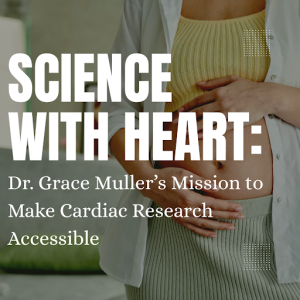Science with Heart: Dr. Grace Muller’s Mission to Make Cardiac Research Accessible
By Emily Krueger, C2ST Intern, Loyola University
Biomedical research allows us to better understand how our bodies function, yet this information is often inaccessible to those outside of scientific spaces. These barriers limit our understanding of our bodies and health. Some scientists are working to close this gap and make sure that everyone has a fair chance to learn about science. Dr. Grace Muller is one such scientist. Dr. Muller is a biomedical researcher specializing in cardiac physiology and a faculty member at Loyola University Chicago. Her research focuses on understanding how the heart works during conditions like heart failure or during physiological challenges like pregnancy. Let’s learn more about Dr. Muller’s scientific journey and see how she is integrating her research with outreach initiatives!

Dr. Muller’s scientific path started early when she gained research experience as a high school student. Her research on a fruit fly (Drosophila) project exposed her to science on a very small scale. This made her wonder at what was happening inside the cells of the fruit fly to explain observations at the organism level. After this research experience, she took a developmental biology class, which sparked her interest in the heart. She was fascinated by the heart because the heart is the first organ to develop when a baby begins to grow. Her interest in heart function would prove to be long-lasting as she continued researching the heart through her time as a graduate student to her work as a post-doctoral researcher. Now, as an assistant professor, Dr. Muller studies how the heart contracts. Heart contraction is crucial for ensuring that the heart pumps blood throughout our body, and when heart contraction is decreased, heart failure can occur.
Her research took on a more personal dimension, though, when she became pregnant with her first child. Despite her training in physiology, Dr. Muller found herself unfamiliar with many of the changes happening in her own body— particularly those related to cardiovascular function. She describes this as a “unique window for sympathizing with other birthing people” because, despite her scientific training, she felt she lacked knowledge about the experience she was undergoing. She acknowledged, though, that she had an immense amount of privilege during this time, as she was able to access and understand information at a high level because of her training. This realization that so many others do not have the same privilege motivated Dr. Muller to begin asking deeper questions about heart function during pregnancy and create a space to share this information.
One of the leading causes of death for birthing people is cardiovascular disease. Particularly, non-Hispanic black women face disproportionately higher rates of health complications during pregnancy and after birth, many of which are cardiovascular in nature. Yet, heart health is often overlooked in prenatal and postpartum care. Drawing from her own experiences and her training, Dr. Muller sees it as a responsibility to bring science and health resources to the communities who need it most. While she is not a medical doctor, Dr. Muller believes that scientists have a duty to share evidence-based information outside of academic spaces in accessible ways.
To that end, Dr. Muller has hosted free public lectures at the Maywood and North Riverside libraries entitled “Pregnancy and People’s Bodies.” These sessions focused on sharing evidence-based information about physiological changes during pregnancy and postpartum that go beyond the normal discourse surrounding these topics. Dr. Muller dives deep into changes that are not often talked about with pregnancy and postpartum, and she uses her expertise to ensure that the information is presented in an approachable way. This series was designed for community members who may not otherwise have access to this kind of information. The goal, Dr. Muller says, is “not just to teach birthing people about these changes but to empower them through this knowledge.”
This spirit of outreach extends into her classroom. Dr. Muller will be teaching a physiology course this upcoming year dedicated to maternal health and cardiovascular function. Alongside physiology content, the students will learn how to communicate science to non-scientist audiences and conduct similar talks in the community modeled after her lecture series. Dr. Muller explains that “experiential learning empowers students to make an impact beyond the lab.”
Dr. Muller’s research and outreach efforts are shaped by her identity. “Being a wife, mother, and daughter drives me forward,” she says. “These identities shape everything I do.” Her path through two pregnancies while managing her growing lab has not been simple, but she credits her support systems in her family, mentors, and academic community for encouraging her through this journey. She emphasizes that she is especially grateful for those who came before her and those who have made space for scientists to show up as whole people. For early-career scientists, particularly those balancing research, identity, and caregiving, Dr. Muller offers this advice: seek out mentors and peers who make you feel supported, build strong personal and professional networks, and maintain a sense of self through it all, as she says: “Be devoted here, and then go home.”
If you are interested in checking out more of Dr. Muller’s work, check out her lab’s website:
References:
- https://www.eurostemcell.org/heart-our-first-organ
- https://www.healthline.com/health/heart-disease/decreased-cardiac-output-symptoms#definition
- https://www.cdc.gov/maternal-mortality/php/data-research/mmrc-2017-2019.html#:~:text=Among%20the%201%2C018%20pregnancy%2Drelated,because%20of%20small%20population%20size.
- https://www.cdc.gov/womens-health/features/maternal-mortality.html